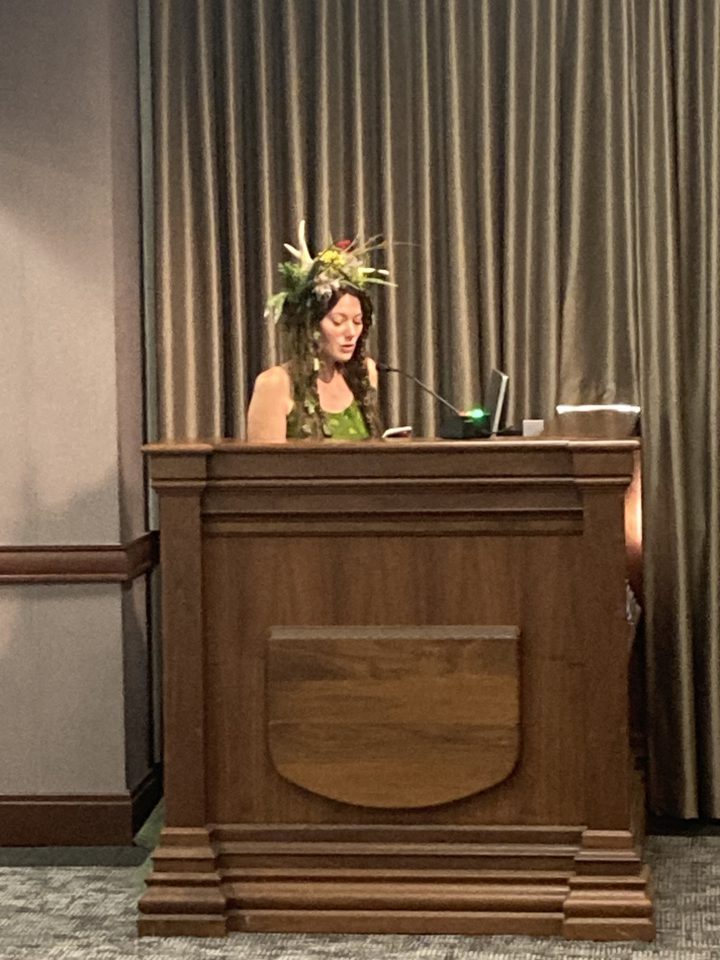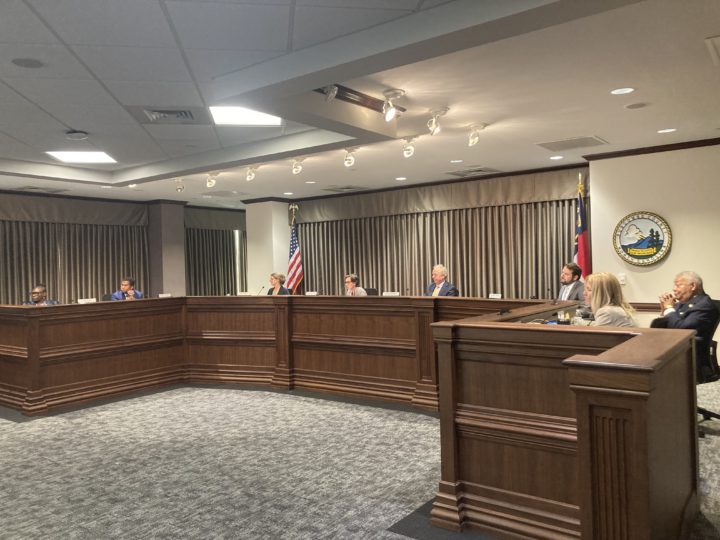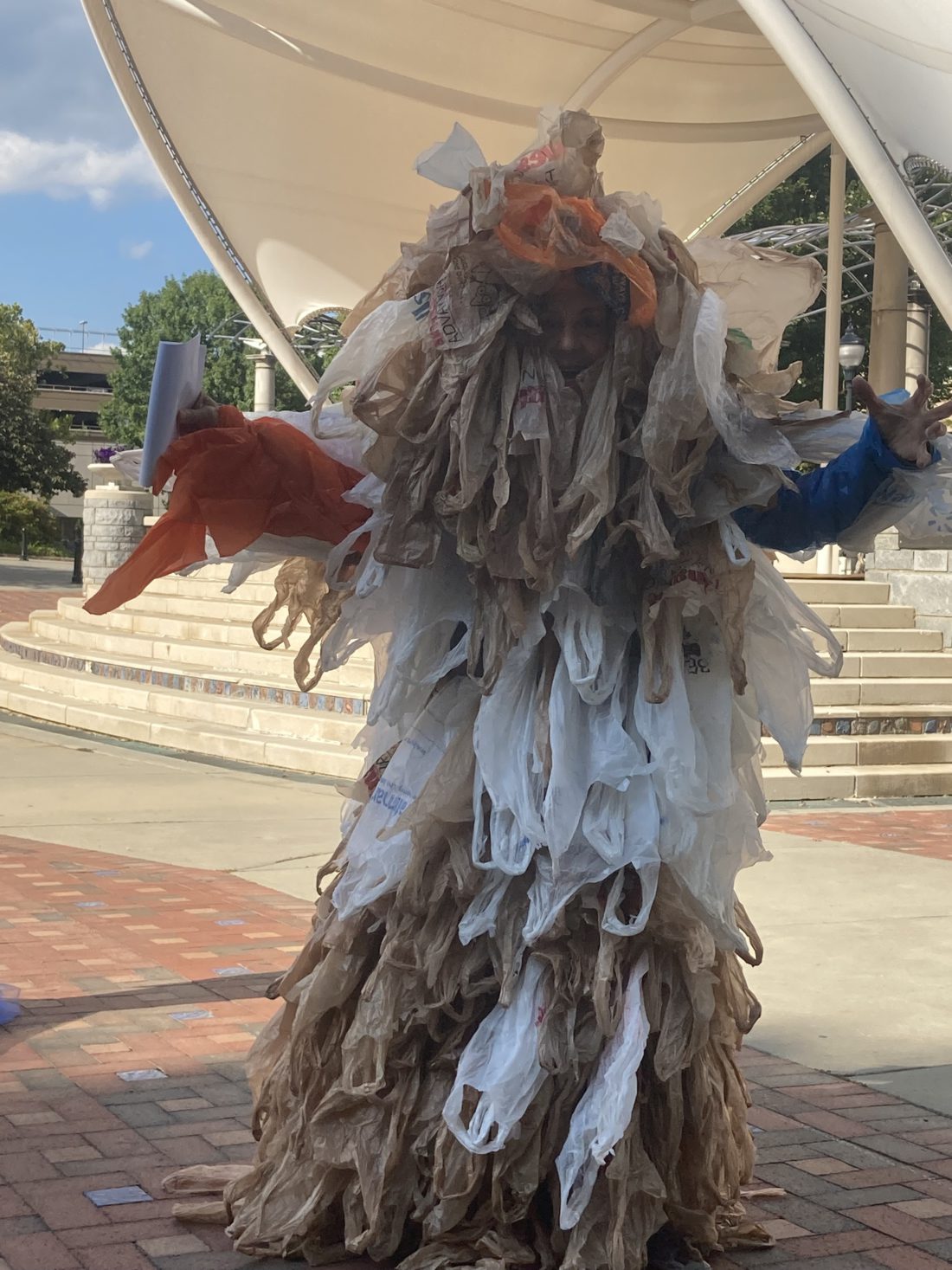Following a rally of about 50 in Pack Square on Sept. 19, more than a dozen members of the Plastic-Free WNC coalition urged the Buncombe County Board of Commissioners to fight for its right to ban single-use plastic bags with a countywide ordinance.
The group had to change its message abruptly as state legislators added language to the state budget that would bar counties from regulating plastic bags.
“It’s a cynical and shameful ploy to deny you the ability to serve your constituents. It’s anti-democratic, and I look forward to working together with you to reject this encroachment on our rights to protect our health and the health of our mountains, rivers and streams,” Karim Olaechea, deputy director of strategy and communications for MountainTrue, told commissioners during public comment.
A draft of the state budget now includes the following: “No county may adopt an ordinance, resolution, regulation or rule to restrict, tax, charge a fee, prohibit or otherwise regulate the use, disposition or sale of an auxiliary container.” Auxiliary containers are defined as “a bag, cup, package, container, bottle, device or other packaging.”
State Sen. Julie Mayfield, former MountainTrue co-director who has advocated for a single-use plastic bag ban, said she expected the budget to pass with the language intact.
“I think we may have lost this round, unfortunately. But we’re not finished. I mean, I won’t lie; this is an unfortunate setback, but it does not mean that we’re going away on our advocacy around plastic production,” Mayfield told Xpress Sept. 20.

Plastic-Free WNC, which consists of several local environmental groups, has been leading efforts to pass an ordinance in both the county and City of Asheville for years, Olaechea said. This year, a city survey of Asheville residents found more than 80% supported a ban. The towns of Woodfin and Black Mountain passed resolutions supporting a countywide ban in recent months, leading to the environmental coalition speaking to commissioners Sept. 19.
One of them, tour guide Sarah Ray, dressed up as a French Broad mermaid for the occasion.
“I love sharing [Asheville] as a tour guide so much. But when there are plastic bags caught in the trees and blowing through the streets and stuck on the base of the fringe of our river, it’s embarrassing. It’s also sad and it’s frightening that so many of our treasured plants and animals and even ourselves are unwittingly consuming plastics just by drinking water and breathing air,” she told commissioners.
Ani Johnson, a senior at Asheville High School, said: “For the sake of our future, please take action. I know that there are barriers as we’ve talked about earlier, but please, for the sake of our future, take action to stop this. Our future doesn’t have the time to wait.”
Commissioners did not respond directly to the public commenters.
In other news
For the first time since 2017, commissioners voted unanimously to increase requirements for businesses to get economic development incentives for bringing jobs to the county.
At the low end, businesses can get a $500 incentive for every job they bring that pays between $28.70 and $35.74 hourly, up from $20.93 to $26.92 for the lowest incentive. The previous amounts were based on average wages in Buncombe County; the new scale is based on area median income.

Wages are what people make at a given job, while income includes other sources, like second jobs or Social Security benefits, said Tim Love, director of economic development and government relations for Buncombe County.
Commissioner Amanda Edwards said she would rather use local area median income as a benchmark because that is what is used when determining what constitutes affordable housing for real estate developers looking for their own county incentives.
In the 2025 strategic plan, Love said the county’s goal is to have county incentives match statewide area median income, which is slightly higher than Buncombe’s, according to Love’s presentation.
Additionally, employers can get $1,000 per employee if they pay more than a living wage and participate in Inclusive Hiring Partners or an equivalent workforce program such as NCWorks, Love said. Employers previously qualified for $500 per employee if they met those standards.
Commission Chair Brownie Newman said the county should consider requiring companies to pay their entire workforce a living wage to get county incentives.
Commissioner Al Whitesides said if a company pays 50% of its workforce below a living wage, they shouldn’t earn an incentive.
“You’re talking about people who will be struggling to live. We need to make sure that we have companies coming in who make it so that everybody can afford to live,” he said.
Love said staff would look into requiring a percentage of a company’s workforce to make a living wage in an upcoming second phase of economic development incentive updates.






Before you comment
The comments section is here to provide a platform for civil dialogue on the issues we face together as a local community. Xpress is committed to offering this platform for all voices, but when the tone of the discussion gets nasty or strays off topic, we believe many people choose not to participate. Xpress editors are determined to moderate comments to ensure a constructive interchange is maintained. All comments judged not to be in keeping with the spirit of civil discourse will be removed and repeat violators will be banned. See here for our terms of service. Thank you for being part of this effort to promote respectful discussion.